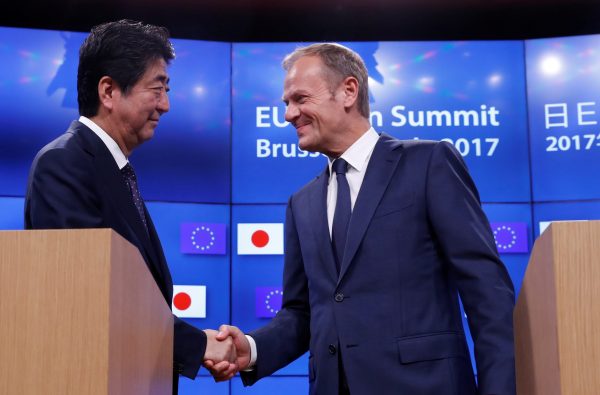The political importance of the Japan–EU Economic Partnership Agreement (JEEPA) is significant and goes well beyond the gains in import and export trade between its two signatories, though these are substantial.
JEEPA is more evidence that under Abe, Japan has become a trade leader rather than a trade follower. It has shifted to a strongly proactive stance on agreements to liberalise trade, including an ambition to lead by example in promoting wide-ranging trade and economic agreements between states.
The assumption of such a leadership role on trade reflects a number of factors. Among them is the Abe administration’s much-touted view that such agreements will contribute to Japan’s economic growth and generate significant leverage to advance the government’s structural reform program. Abe declared that both JEEPA and TPP-11 were ‘the pillars of his Cabinet’s growth strategy’ and that JEEPA would become a new engine of Abenomics’.
Another factor is the United States’ retreat from its traditional leadership role on trade issues under Trump. Japan has stepped into the United States’ shoes on the TPP by pushing to seal the deal among the remaining parties to the negotiations, with Japan’s Ministry of Foreign Affairs reportedly aiming to make the TPP-11 rules the new rules for trade liberalisation in the Asia Pacific. Abe is also trumpeting the strategic as well as the economic importance of JEEPA, particularly its role in stopping the trend of protectionist trade from gaining further momentum. Not only will it ‘keep the flag of free trade waving high’ but it will also, in Abe’s words, build ‘a free, fair and rule-based economic zone, which will be a model of an economic order in the international community in the 21st century’.
Yoichi Funabashi accurately describes Japan and Europe’s shared strategic intent to guide the world’s rule-making and to maintain the international order in agreeing ‘to open up the world’s largest free trade space’. Japan, in concert with Europe, is trying to build a future-oriented global rules-based order to replace the post-war US-led order while the United States’ international trade leadership erodes further.
Critically, the Abe administration does not see the broader strategic goals served by JEEPA as advanced by a US–Japan bilateral free trade agreement. Thus far, the Abe government has successfully deflected US pressure for negotiations with its proposal for economic dialogue.
JEEPA underlines Japan’s preferred model of trade agreements as give-and-take on both sides, not the preferred Trump model where US trading partners give and the United States takes. The latter would revert to the old order, where, as Dr Kristen Hopewell so aptly put it, ‘Washington was minimalist in making concessions but maximalist in making demands of others’.
The Japanese government now firmly opposes negotiating under US external pressure (gaiatsu) and under relations of power asymmetry between the two states, fearing a return to the United States’ ‘aggressive unilateralism’ of yore. JEEPA sets new standards for creating, as Abe put it, an ‘economic bloc based on free and fair rules’ and provides a new and invigorated model of Japan on the trade ‘offensive’ rather than on the ‘defensive’, thus reversing the traditional roles of the United States and Japan in trade negotiations.
At the same time, the Japanese government views JEEPA as strengthening its hand in any possible future bilateral trade negotiations with the United States. The value of JEEPA in this context is in representing a victory for multilateralism over bilateralism, free and fair trade over protectionism and win-win over zero-sum deals in which the United States wins and trading partners concede in deals specifically designed to reduce US trade deficits.
Japan is hoping that like TPP-11, JEEPA will send a strong message to the Trump administration on the value of a free and fair global trading system.
Aurelia George Mulgan is a Professor in the School of Humanities and Social Sciences at the University of New South Wales, Canberra.

